COMED-K Code: E204
Lighted to Enlighten
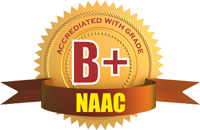
Mechanical Engineering
About
The Department of Mechanical Engineering was established in the year 1979 with an intake of 60 students under Gulbarga University, Kalaburgi. The department has committed and dedicated team of 11 teaching staff with masters and PhD degrees. Specialization in Thermal,Production and Design streams. A team of non teaching staff supports the department in conducting labs. The department has well equipped labs and all licensed softwares as per AICTE/VTU requirements. A Departmental Association is formed with a faculty as an advisor. The Association helps in arranging programmes for students to exhibit their talents in cultural,sports,technical events and helping in overall development of the students.
The department with help of Alumni Association of the college invites the Alumni for seminars,helping students with their internship and industrial projects and also guiding them in shaping their future.
Vision
To be recognized as a trend setting department of excellence by providing highly competent and quality Education to Mechanical Engineering students to meet the changing needs of mechanical industries and also contribute in research, relevant to industry and society.
Mission
-To be an ideal department in imparting quality education to the students and enhancing their skills to make them to be competitive
to the industry.
-Training the students in tune with the evolving challenges and societal needs through flexible and innovative learning process.
-To establish centers of excellence and collaborate with R and D organizations to foster research activities.
-To collaborate with Industries to provide solutions to identified problems.
-To promote entrepreneurship.
SWOC
Strength:
1. Experienced teaching staff with an average experience of 18 years.
2. Well-equipped Labs.
3. Meticulous working culture in the Department.
4. Mentoring of the students to improve their performance.
5. Conducting programs for improving the soft skills of the students.
6. Arranging the training program for campus selection.
Weakness:
1. Very low CET rank Students are admitted.
2. Fewer placements.
3. Locality disadvantage.
4. Climatic conditions of Raichur City.
Opportunity:
1. Aligning the students with emerging trends in education.
2. Encouraging new ideas and support for start-up Innovations.
3. To inculcate meticulous working culture with the Students.
4. To achieve and maintainresults above VTU results.
5. To imbibe fairness, transparency and ethics in the students.
6. To build the strong future leaders.
Challenge:
1. Gap between Industry and Academia.
2. Poor communication skill of students.
3. Lack of Mechanical Industries in this region.
Faculty
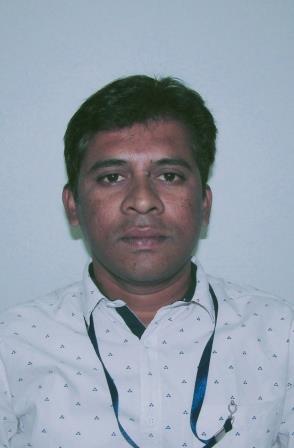 Anil M. Kanta, M.Tech
Anil M. Kanta, M.Tech
Assistant Professor & HOD
Experience-5 Years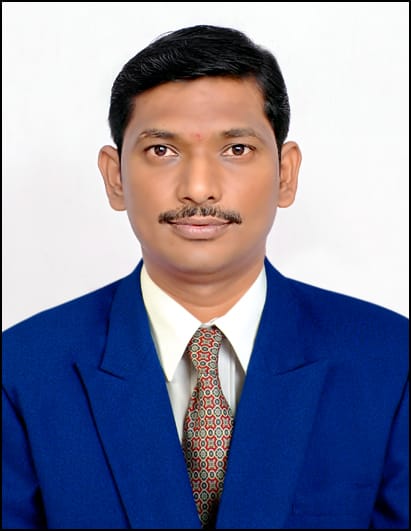 Dr. Venugopal N., PhD.
Dr. Venugopal N., PhD.
Associate Professor
Experience-8 Years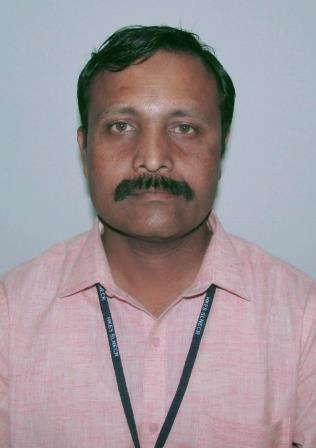 Hanumanth Rao Diwate, M.Tech
Hanumanth Rao Diwate, M.Tech
Assistant Professor
Experience-15 Years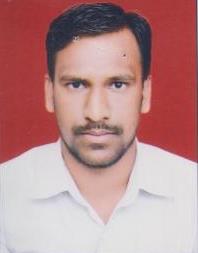 Sangamesh N.D., M.Tech
Sangamesh N.D., M.Tech
Assistant Professor
Experience-8 Years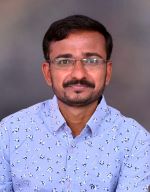 Vinayak Horapyati, M.Tech
Vinayak Horapyati, M.Tech
Assistant Professor
Experience-5 Years Shrishaila Reddy, M.Tech
Shrishaila Reddy, M.Tech
Assistant Professor
Experience-4 Years Vijendra Kukanur, M.Tech
Vijendra Kukanur, M.Tech
Assistant Professor
Experience-9 Years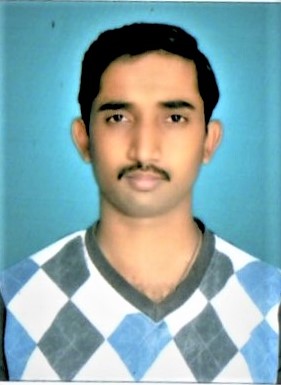 Dwaraka Prasad, M.Tech
Dwaraka Prasad, M.Tech
Assistant Professor
Experience-1 Years
Infrastructure
The department has 11 laboratories. We have more than 35 dual core i3, i5 computer systems and all are connected in LAN. The department also has the WiFi facility. More than 12 legal application softwares and many open licence application softwares are present.
Reprographics facilities are also available in the department itself. And also all the labs have First Aid facilities.
Laboratory details
| Name of the Lab | Area in Sq.m | Major Equipments |
| Lab 1 FMS Lab |
Centrifugal Pump, Pelton Turbine, Franscis Turbine, Kaplan Turbine, Gear Pump, Reciprocating Pump. |
|
| Lab 2 CAED Lab |
21 (HP core i3 and Dual core) systems, Canon LBP 2900b Laser printer,100mps and 1gbps switch, UPS equipped with LED projector & installed with Solid edge software |
|
| Lab 3 Foundry & Forging Lab |
Sand Testing Equipment & Core Testing,UTM Compression Testing Machine,Sand Ramming Tools, Mould Boxes & Paterns, Gas furnace |
|
| Lab 4 MS & MT Lab |
Metallurgical Microscope 2 Nos, Polishing Machine for Specimen | |
| Lab 5 Material Science & Inst |
Metallurgical Microscope, Polishing specimens Universal Testing Machine's Compassion Testing Machine | |
| Lab 6 Heat Transfer Lab |
Thermal Conductivity, Natural and forced convection, Emmisivity, Heat exchanger, Pin-Fin apparatus, refrigeration and Air Conditioning. |
|
| Lab 7 CAD & CAM |
20 PCs M Tab Milling, Solid Edge Software 60 Licenses, Server Upgrade Dual Core, P4 2.8X2 160 4B Hard Disk, Analysis 13 SNX Can Software and UPS power backup. |
|
| Lab 8 Energy Conversion Lab |
Morse Test,Single cylinder Diesel Engine, Multi Cylinder diesel Engine, Air Compressor,Four Stroke Petrol engine,Redwood Viscometer, Pensky martin apparatus, Valve timing diagram. |
|
| Lab 9 Basic Workshop |
Chisels-05, Hacksaw Frame-30, Electrodes, Welding Gun-2, Tongs-20, Cutters=15, Files-60,BenchWise-20, Welding Sheild, Marking Gauge, tri-Square. |
|
| Lab 10 Design Lab |
Governors, Balancing equipment, Gyroscope,Journal Bearing, Vibration Setup |
|
| Lab 11 Machine Shop |
21 Lathe, 02 Shapers, 02 Milling, 01 Su 2101 Automatic Capstan & Turret Lathe, Are Welding Aircolled & Hot Spot welding Testing equipment , Core Testing. |
Syllabus
Timetable
PSOs & COs
Programme Specific Outcomes
PSO3: Apply the knowledge of manufacturing the components which are to be cost competitive in the market.
Course Outcome : Click here
MOUs
- Pantech Prolabs Pvt. Ltd., Hyderabad
- CADMAXX Pvt. Ltd., Bengaluru
- Bosch Rexroth Center of Compete, Kalaburgi
Feedback Analysis


News & Events
Photo Gallery
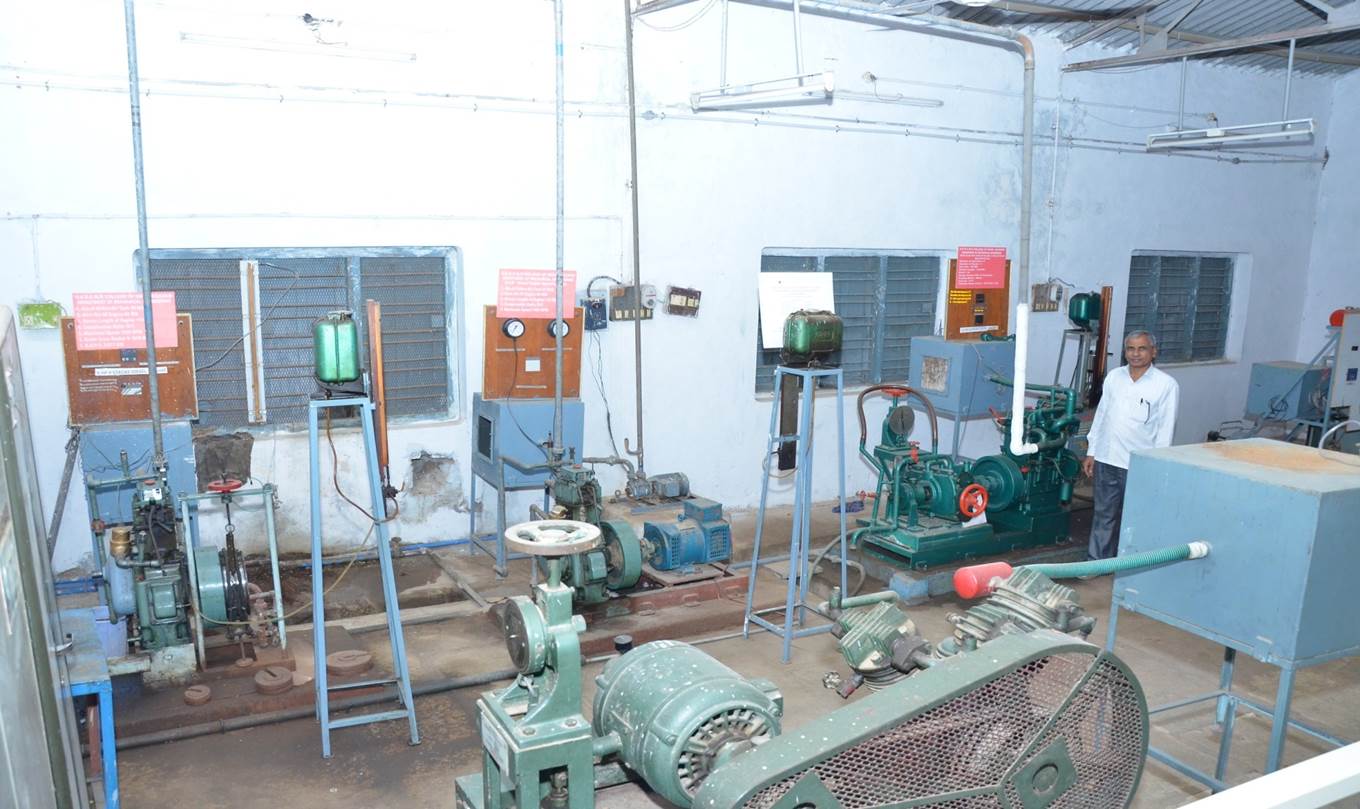 Energy Lab |
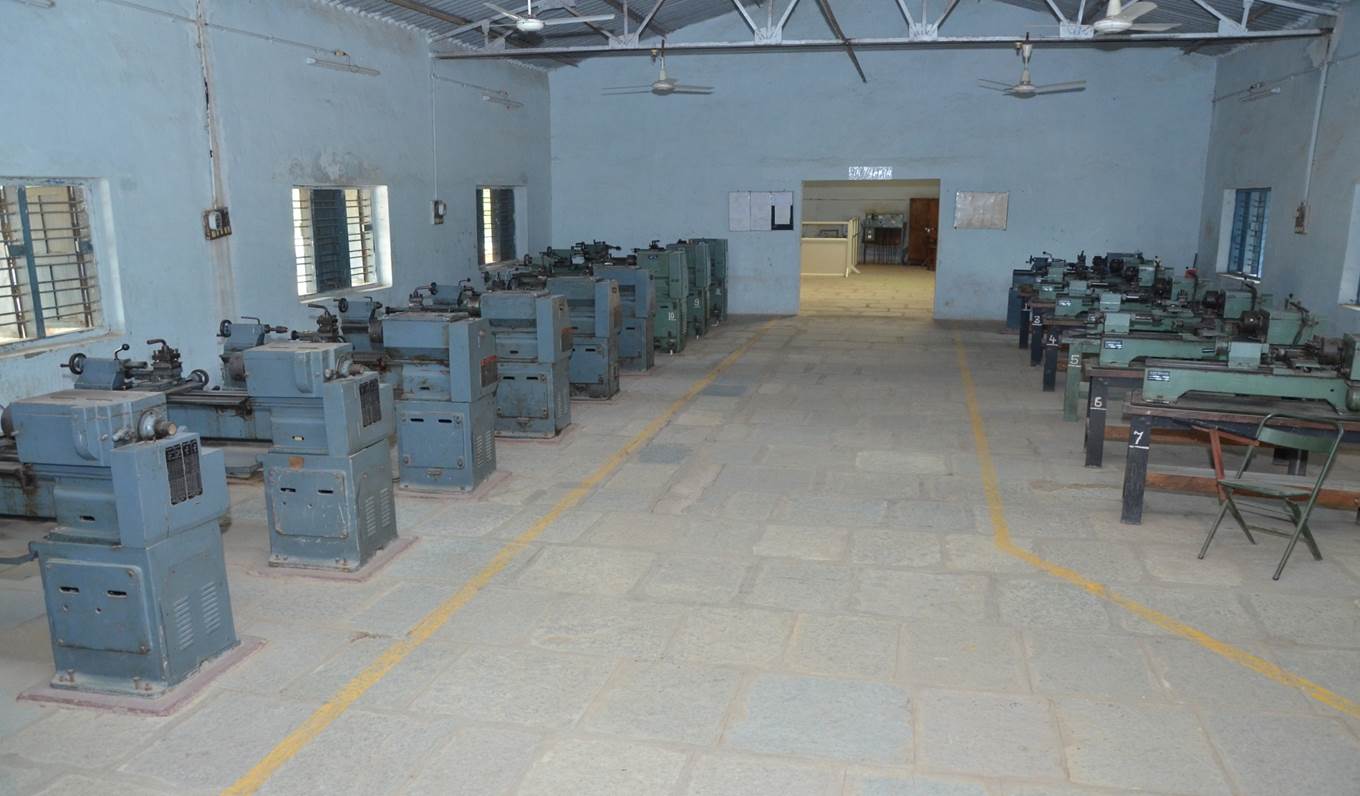 Machine Lab |
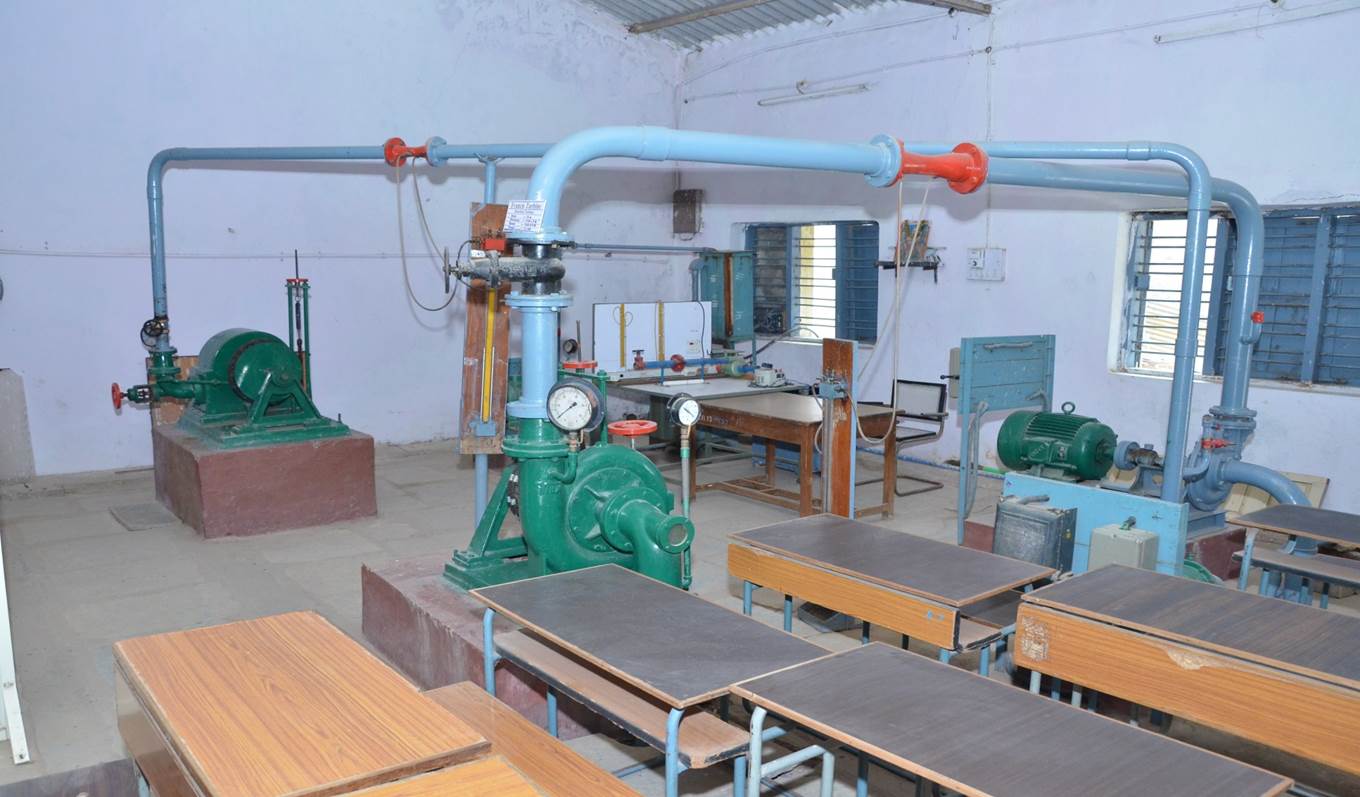 Fluid Mechanics Lab |
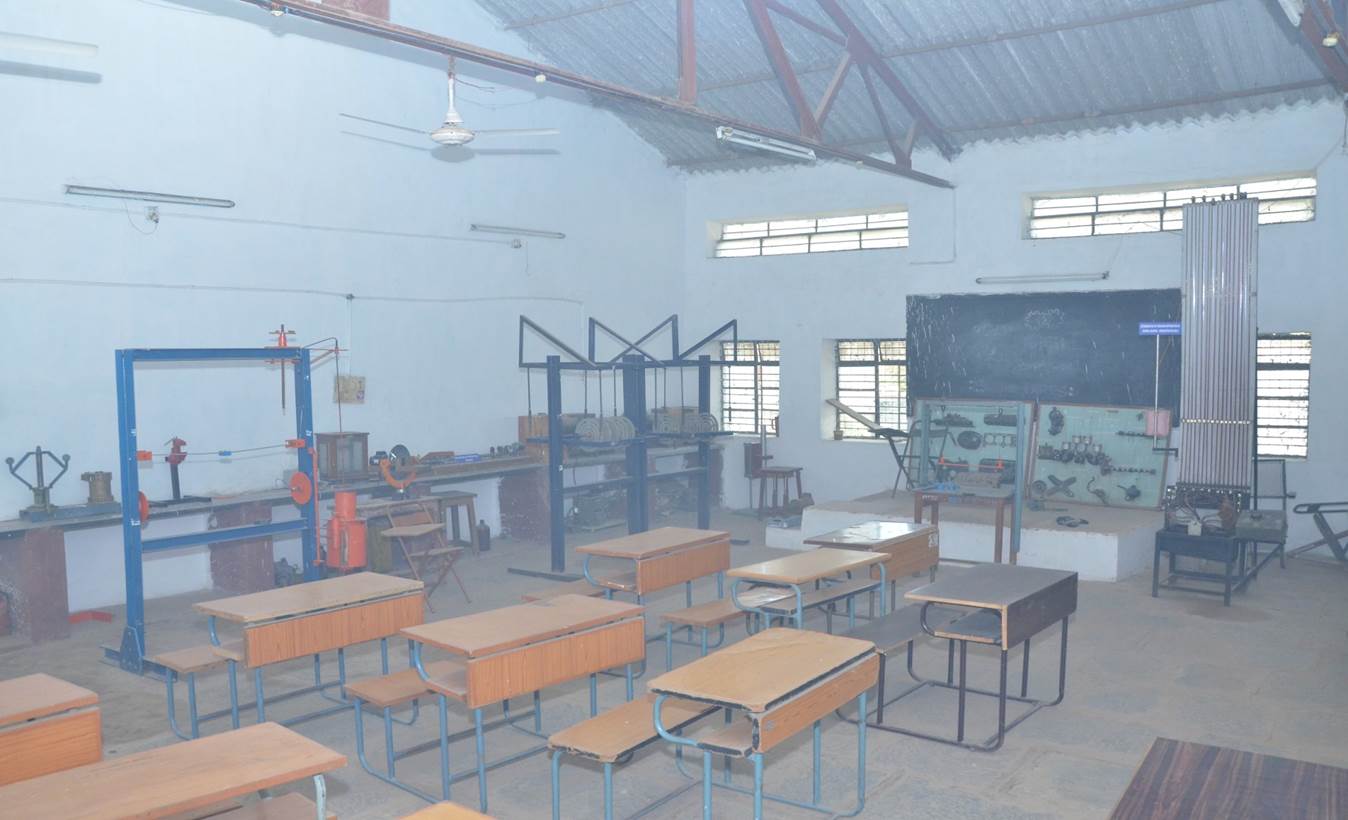 Design Lab |
